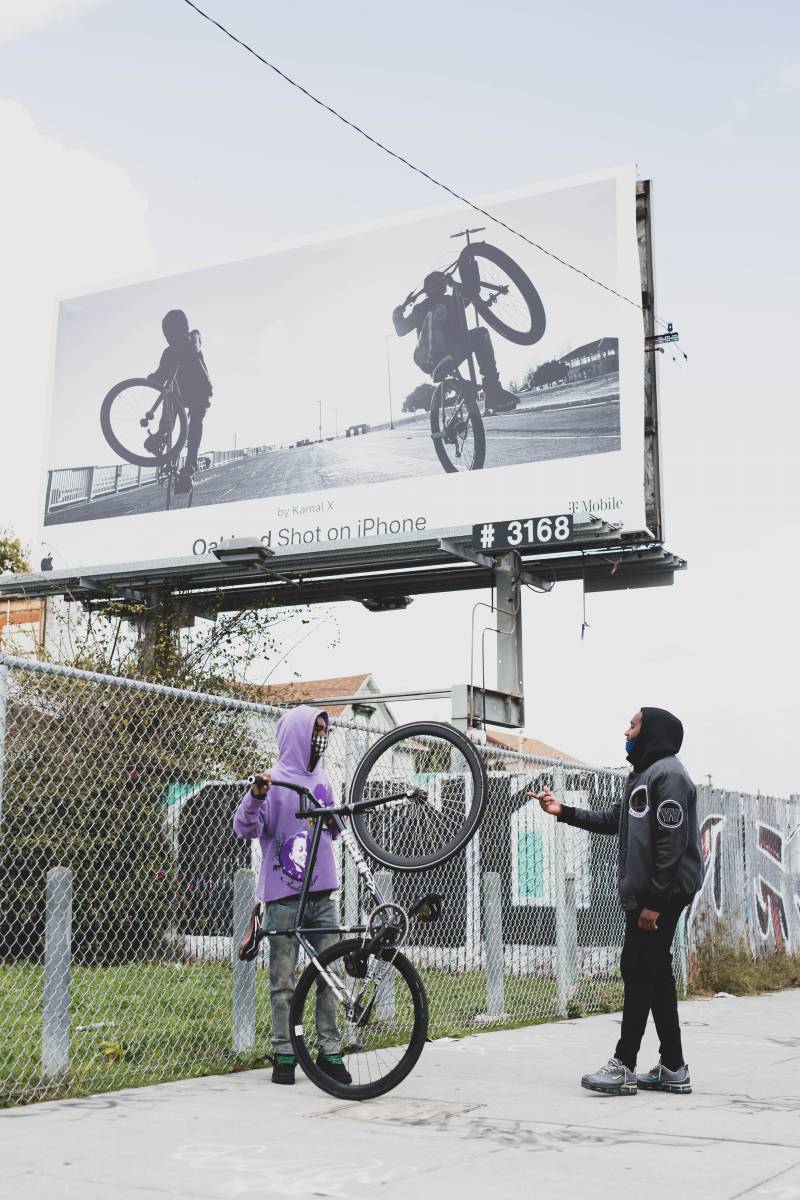What I saw as a major tech company leveraging culture to earn cool points, Jones sees as a platform benefiting the culture he represents.
While there’s room for both to be true, Jones points out something that I overlooked: we breed hustlers in this region, so he’ll figure out a way to make it work in his favor.
On top of that, Jones is working to expand opportunities to a younger generation of East Bay bikers, setting them up with brands and employment opportunities.
Tune in for the second entry on the intersection of wheels, community, and culture as Jones and I discuss biking, billboards, and being a community “big bro.”
Below are lightly edited excerpts of my conversation with Omar Jones.
Pen: So one of the bike groups you ride with and photograph is ABC– who are they?
Omar: So ABC is a bike club in the Bay Area and every Wednesday we meet at King Kog in Oakland. And it just grew, 10 people at first, riding through COVID… Now we have like 150 to 200 riders, 250 riders. It pretty much grew into a big community.
Pen: What’s it like riding with that pack?
Omar: It’s cool. A lot of people that we’re riding with, we know how to ride with each other. So that’s cool. But, the newer [riders], it’s kind of harder because they don’t really know how we ride. It’s not like they get in a way, but you gotta be cautious of your area because sometimes people crash. I mean, that’s going to happen with a big crowd of people moving through the streets. But we usually keep it very safe and super fun. We go like 10 miles every time with like 200 people.
Pen: There’s benefits to riding in groups, it’s fun being in that big pack of people and shutting down traffic, but it’s also dangerous, one slip up, people fall like dominoes.
Omar: If somebody does crash, the whole pack stops and we just make sure everybody is good. That’s what’s cool, it’s like a real community, it’s not like we just keep going and leave people. Nah, everybody stops. We got people in our club that do the bike stuff and just to fix it real quick and just keep going.
Pen: ABC, what does it stand for?
Omar: Another Bike Club, and the slogan is “Fun Is Serious Business.”
Pen: That’s just one of the collectives that you’re biking with, what’s another group?
Omar: It’s called GoersGo. It’s a bunch of kids that I’m helping. That’s been a huge impact because it’s kids ages 12 to 18. I’ve just been kind of like impacting their lives.
Omar: For them to be able to tag along with me and just see how I move… I didn’t have a person like me at that age, so I know it’s an important time for them… I tell them all the time too, ‘I’m not going to always be here. I’m not going to always be able to be around you… That’s why I built this for you, you guys gotta support each other as a team.’
Omar: Whatever money comes to them is 100% theirs. I just have the resources to be able to put them in those positions, like having a photographer friend that happened to be doing an Apple campaign.
Pen: How does it feel to be a mentor?
Omar: I’ve never been called a mentor. It’s like a Big Brother thing. I don’t see it like anything other than that…
Pen: So you’re deeply immersed in the culture of wheels and biking… And i’m wondering what are some of the other positive effects of biking culture?
Omar: It’s just amazing to see all these kids riding these bikes, it’s good to see them off their phones, outside enjoying the weather because if they didn’t have the bikes, the streets is going to eat them up alive. I can’t even lie about that. I grew up around all that… This summer is gonna be why the murder rate is not as big, because kids are going to be out on their bikes, that’s how I feel…
Pen: Woah, you look at biking as a deterrent to violence?
Omar: It’s worked in the past, ya know. I’ve seen Scraper Bikes, what they’ve done. It keeps me out of the street. And the kids around me, it keeps them outta the streets, that’s basically where I can see it going.
Pen: Alright, so the first time you saw the billboard with you and Gio hittin’ wheelies, how’d ya feel?
Omar: The first time I saw it, I was like, damn, this is like incredible. Like to have the brand partner, that’s like, I wouldn’t say legendary, but people give me that status.



